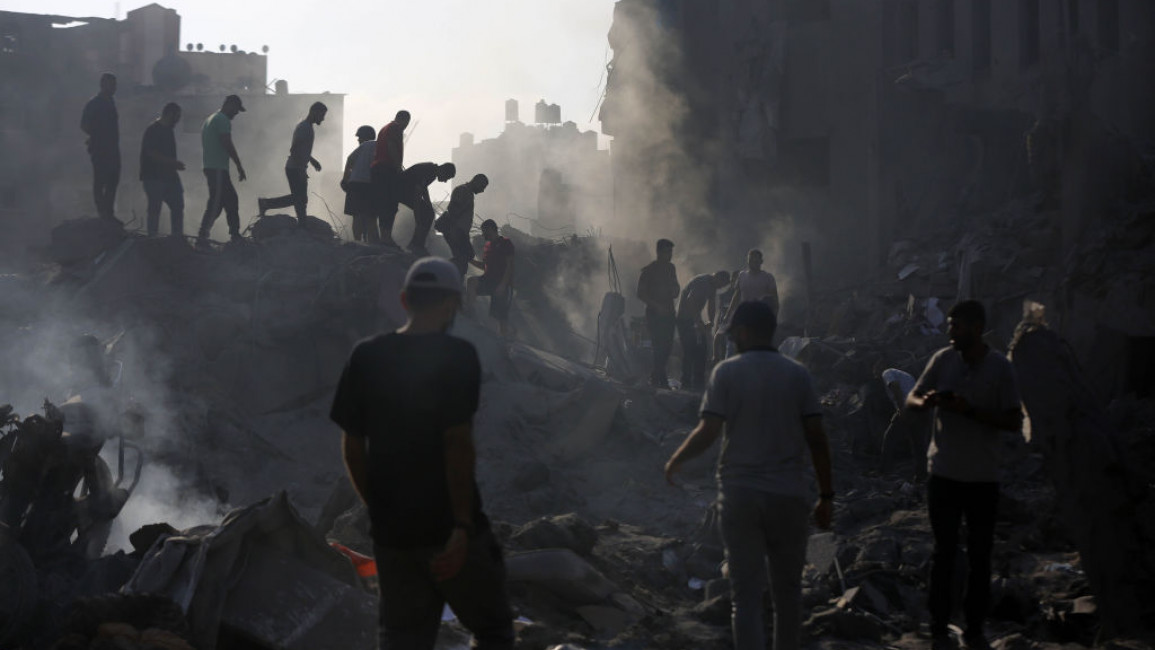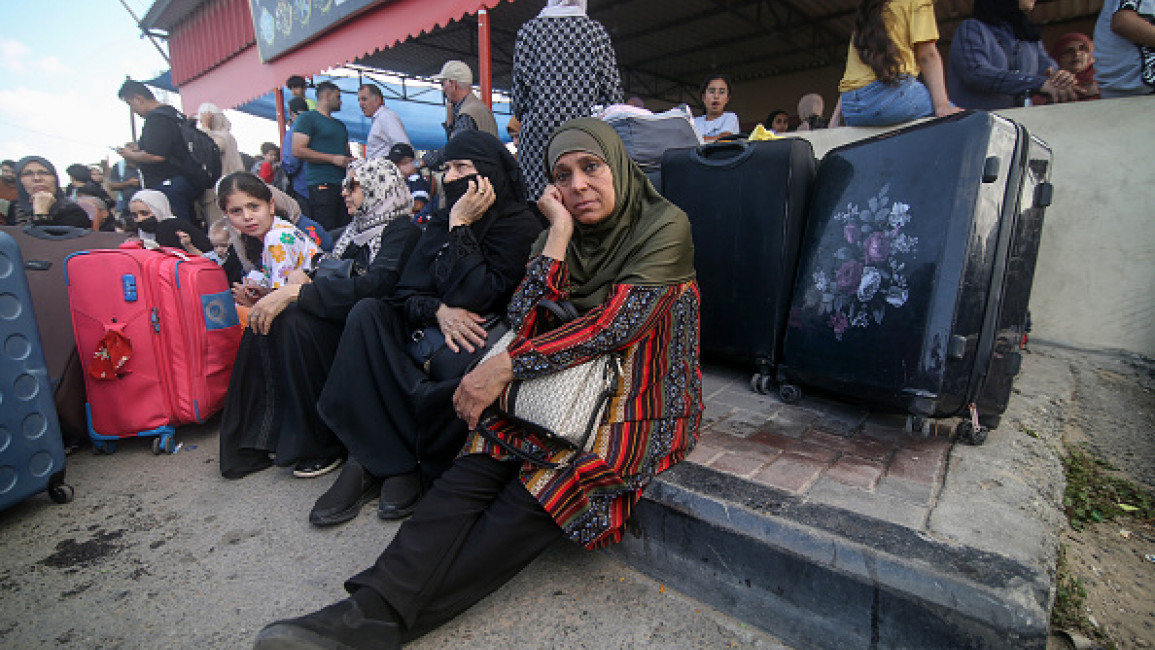
Why Egypt is pushing back against Israel's Gaza refugee plans

Egypt is facing increasing pressure to accept Palestinian refugees as the humanitarian situation in Gaza spirals and Israel pushes the population south towards the Egyptian border.
President Abdel Fattah el-Sisi has categorically rejected a forced resettlement and the idea is generating fury among Egyptians.
Why then do Israel and Western governments still entertain the chance Egypt would budge on its firm position?
Israel is considering expelling the Palestinian population in Gaza into tent cities in Sinai, according to one leaked report. In exchange, Egypt would receive "financial assistance for the current economic crisis in Egypt".
Resettlement would be devastating for the Palestinian cause, as Sisi has said himself, since the refugees would most likely be forever displaced in a second ‘Nakba’. Israel would also be making a direct threat to Egyptian sovereignty, which Egyptian officials have declared is an absolute red line.
"Israeli Prime Minister Benjamin Netanyahu has reportedly lobbied Western nations in private to support its plan to resettle Palestinians in Sinai"
“It is an international crime to displace people, to displace the Palestinians to Sinai, or into any other land,” Yassin Ashour, an Egyptian political consultant on Middle East and Arab affairs, told The New Arab.
Israeli Prime Minister Benjamin Netanyahu has reportedly lobbied Western nations in private to support its plan to resettle Palestinians in Sinai.
“This is a forced displacement and the suggestion completely ignores all these articles in international law,” said Ashour. “It is surprising to many Egyptians and to all Arabs. The West is not part of the conflict. It is Egyptian land, and only the Egyptian Government has sovereignty and autonomy over this land.”
Given the affront such a bold move would create, it is perhaps less surprising if Israel and its allies try economic leverage on Egypt first. Egypt spends over 50% of its gross budget on debt servicing costs and over the past several years has explored alternative means to address budget deficits.
“European and some Gulf countries are trying to provide economic aid in order for Egypt to play a strong role in the humanitarian crisis,” Giuseppe Dentice, head of the MENA desk at the Centre for International Studies, told TNA.
The EU has already accelerated a financial aid package to Egypt aimed at preventing a surge of migrants from Egypt, as the nation continues to grapple with an economic crisis, with many EU states fearing the war in Gaza could produce a new wave of refugees.
In the past week, Egypt has opened the Rafah crossing to allow foreign passport holders to exit Gaza and provide urgent medical aid to severe casualties. Egypt has expressed willingness to provide humanitarian aid but has been wary about allowing a large number of refugees to cross into Sinai.
For Ashour and indeed most Egyptians, the solution is simple and lies with Israel.
"The logic is wrong in the West,” he said. “It is Israel that is killing thousands of Palestinians in Gaza. The solution is not in Cairo. It is in Tel Aviv: The Israeli right-wing government stops the killing. Palestinians should have a say. They should have the basic human right which is to live in their homes safely."
|
|
Perfect storm
The Gaza crisis comes at a time when Egypt is negotiating a larger financial package from the IMF to help with its economic crisis. President Sisi also faces presidential elections in December.
Egypt may be clear these considerations do not supersede the Palestinian cause, international law, and its grasp of historical precedents. But that will not make its position any easier if browbeating intensifies from all sides.
For Dentice, the timing creates a ‘perfect storm’. “The situation is very difficult for Egypt as the economic crisis is terrible and there is another element, the presidential election. For these reasons, I think that financial aid in order to accept the humanitarian crisis could be a real deal,” he said.
“However, I don’t think the proposal to cancel debts in exchange for Egypt’s resettling refugees is a solution.”
"The situation is very difficult for Egypt as the economic crisis is terrible and there is another element, the presidential election. For these reasons, I think that financial aid in order to accept the humanitarian crisis could be a real deal"
A flood of Palestinian refugees into Sinai could also worsen Egypt’s situation longer-term and harm the social dynamics of society, Ashour believes.
“An influx of any population as big as the Gaza population, which is 2.3 million, to Egypt or to any other land, of course, would mess with the social fabric. Sinai is not prepared to become the host anyway and Egypt already hosts around nine million refugees.”
Sinai is unable to support a large population as it faces water, electricity, and food shortages. Historically, in 1947, Gazans fled to Sinai but later returned in 1967 following the six-day war.
“Maybe Egypt can accept a limited number of refugees in a safe zone,” Dentice says. “But a humanitarian crisis in Sinai could quickly transform into a security nightmare.”
According to the leaked Israeli report, Gaza’s 2.3 million population could be resettled into “tent cities” within Sinai before cities are constructed in the “resettled area”.
Egypt's position
President Sisi told attendees at last month’s Cairo Peace Summit that Egypt will continue to reject the forced displacement of Palestinians from Gaza and their transfer to Sinai.
“The Palestinian cause is central to the Egyptian identity,” Ashour explains. “Accepting a forced displacement would be a betrayal of the Palestinian cause.”
There is widespread anger among Egyptians of all generations at Israel’s bombardment of Gaza, which has killed 10,000 Palestinians, and there exists widespread support for the Palestinian cause. But hosting refugees affected by the conflict is considered unacceptable.
|
|
“Egypt would never agree to a resettlement of Palestinian refugees,” said Ashour. “It would be permanent. It will never be temporary as Israel suggests. It ignores all aspects of international law and all aspects of Westphalian sovereignty.”
The Palestinian cause is not the only matter close to Egyptian hearts. Sinai is symbolic of Egypt’s hard-fought peace and was only returned to the country in 1982 as part of negotiations following the Yom Kippur War aimed at reclaiming it in 1973.
"It is Israel that is killing thousands of Palestinians in Gaza. The solution is not in Cairo. It is in Tel Aviv"
Israel had invaded and occupied Sinai during the Suez Crisis of 1956 and later built illegal settlements there after occupying it again in 1967. Though supported in Egypt, critics of the deal to return Sinai said it abandoned the cause of a Palestinian state.
“There is a long history of Egyptian blood being sacrificed over Sinai,” Ashour noted. “But also, as President [Muhammad Anwar El-] Sadat said, if this land is mud, if it's sand, it is still the motherland.”
Lara Gibson is a Cairo-based journalist closely following Egypt's economic and political developments.
Follow her on Twitter: @lar_gibson




